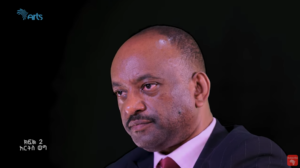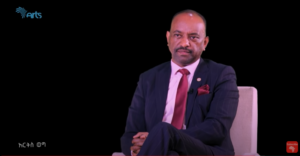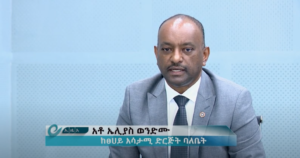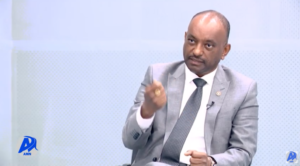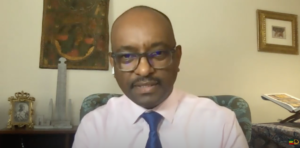THE LOYOLAN NEWSPAPER – Does Chadwick Boseman’s portrayal of Black Panther represent a Black, or African panther? Is Black Panther a hero based in fantasy, or a hero for the diaspora? Six of LMU’s leading African American and African voices set out to answer these questions last Friday in a discussion following a screening of Ryan Coogler’s “Black Panther” — the latest film in Marvel’s Cinematic Universe.
The panel included screen writing professor Michelle Amor, African American studies professors Adilifu Nama and Jennifer Williams, writer and social and cultural commentator Elias Wondimu, and sophomore film and television production major Paisley Sutton. The panel was moderated by Eric Elder, an SFTV professor.
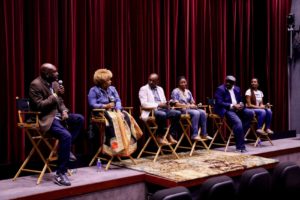
From left to right: Eric Elder (Moderator, SFTV Animation Adjunct Professor), Michelle Amor (SFTV Screenwriting Professor), Elias Wondimu (Editor and Publisher of TSEHAI Publishers), Jennifer Williams, Ph.D (African American Studies Professor), Adilifu Nama, Ph.D (African American Studies Professor), Paisley Sutton (SFTV Student Representative, Secretary for LMU Black Student Union).
Photo by Kathy Che
The film follows T’Challa (Chadwick Boseman) as he becomes king of the fictional African nation of “Wakanda” after the death of his father, assuming the sociological powers of the throne and the physical might of the Black Panther. He soon discovers, though, that a forgotten member of his bloodline is at odds with his kingship.
“I think that one of the important paradigm-shifting elements of this film is the fact that it really undermines the notion that you can’t have an all-black cast, a black director and [black] writers, and not produce a mega-blockbuster that is consumed around the world,” said Nama.
Nama said that before “Black Panther”, there was a “rumor” that movies starring mostly black actors would never leave the United States and be successfully distributed internationally. Black Panther he said, “shatters that notion.”
Amor said that since Black Panther was released, the Writers Guild of America’s committee of black writers has received an increase in calls and emails from the industry. For instance, a show runner recently contacted Amor about putting together a writers room for a show with a “black topic” starring a black actor.
“[The show runner] said – Well, we definitely can’t have that room without black writers — I was like, damn right!” said Amor. “That’s something that we’re seeing that is really good because we should be a part of our own stories.”
Wondimu, who, according to the LMU Newsroom, “has distinguished himself as one of the leading publishers in African literature and academia in the United States” after immigrating from Ethiopia, talked about his experience watching the film as an African-immigrant. He said presentations of Africa before Black Panther were “99.9 percent negative.”
“To see Africa presented [in the film] in its majesty is incredible,” Wondimu said. “Anyone from an African continent or African diaspora can see themselves in this film. It’s the dress, the language, the landscape changes, the music. I think that for [Africans] to be able to go to a movie and see themselves in it is just incredible.”
Elder, the panel moderator, addressed the fact that there has seemingly been a “strained relationship” between Africans and African-Americans in the United States. He asked the panel if they thought the film had been “impacting those relationships,” to which Wondimu delivered a response.
“This conversation has been taking place in different corners,” Wondimu said. “When I came to America, I didn’t expect the socio-political climate that exists within the African-American community, or how African-American life is affected by the majority. The conversation [of how we are seen by African Americans and how our relationship with them has been] is happening in this movie. I think it’s the most important thing for this conversation to take place on this platform.”
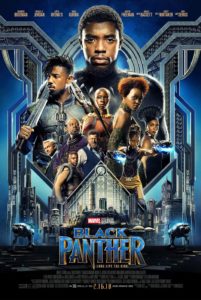 The panel confronted an aspect of African-American life that is addressed by the film’s villain, Killmonger (Michael B. Jordan). Nama encouraged the panel to break down the film, which he called a “flawed masterpiece,” in its aspects that might be problematic, rather than purely constructive and honest to the black experience. Specifically, he pointed out the violent pathological tendencies inherent to the character of Killmonger, who was left alone as a child to fend for himself in the streets of Oakland after his father was murdered.
The panel confronted an aspect of African-American life that is addressed by the film’s villain, Killmonger (Michael B. Jordan). Nama encouraged the panel to break down the film, which he called a “flawed masterpiece,” in its aspects that might be problematic, rather than purely constructive and honest to the black experience. Specifically, he pointed out the violent pathological tendencies inherent to the character of Killmonger, who was left alone as a child to fend for himself in the streets of Oakland after his father was murdered.
Nama said he thinks that [Killmonger] is representative of the “hate that hate produced narrative,” which implies that people who grow up uncared for and outcasted in society end up exerting negative feelings, which they felt intensely as children, onto others in their adulthood. The African American experience has often been portrayed as a “hate that hate produced” experience in film.
“There is a way in which the African-American experience has too often been presented as one of pain, suffering, violence and a type of almost nihilistic, self-destructive sensibility,” Nama said.
This presentation of the African American experience Nama described — an experience he said is held by the character of Killmonger — has led to “a broad dialogue going on about the film where people have taken a very strident position, thinking the film to be a slap in the face to the African-American experience.”
In response, Sutton, a sophomore film and television production major, said that the film puts African Americans in a difficult position, as the hero and the villain are both black — a scenario that she said has traditionally not occurred in film, especially one of the calibre and scope of Black Panther.
“They painted Killmonger as this crazy, psychotic villain, and I think they had to do that. If he wasn’t an evil guy, then I would have probably been rooting for him, because his plan wasn’t all that bad,” she said. “I was considering how this was painting the African American person, and that’s where it becomes kind of problematic — because at the end, where’s our hope? Our hope still lays with the Wakandans coming back to help us. It was a little sad to see where that leaves us, as black people.”
SOURCE: Mitch Storey, The Loyolan Newspaper

